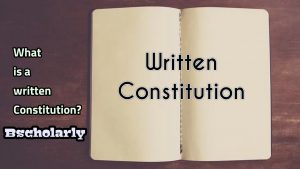Theoretical federalism seems to be one of the best systems of government that is associated with democracy and that is why it is practiced in most countries of the world. Leading countries like the United States, India, Brazil, Mexico, Russia, Germany, Canada, Switzerland, Argentina and even Nigeria practices democracy til today. This shows that there are realistic benefits of the system or reasons why a country should practice it.
Nonetheless, it will be unwise to think that democracy is without its own problems especially where it is practiced in the country which is not suitable for it. In other to educate scholars on the disadvantages or problems of federalism, i will be making a clear and comprehensive discussion of the nature and problems of federalism in this article.
Before we move to the crux of this work, i recommend that you watch the video below to get and overview of what federalism or a federal system of government is.

Also read: Reasons for the adoption of federalism in Nigeria
Nature of federalism
The nature of federal system of government is generally the same in most countries with little variation. The essential features of federalism include a written constitution, the supremacy of the constitution, division of powers between the federal and state government, the existence of a court to interpret the constitution, the rigidity of constitution and the existence of a financial relationship between the federal, the state and the local government.
A country with a federal system of government must possess a written constitution, which must spell out the nature of federalism. The constitution will not be written in order to avoid conflict of interest. The written constitution must spell out areas of interest between the legals of governments. More so, the constitution must be Supreme. That is, it will have supreme authority over every other law in the country.

However, in a federal system of government there could be two constitutions operating in the country; that is, the Federal constitution and the constitution of states. In any case the constitution of the federal government supersedes that of the state where there is a conflict between the two.
Federalism adopts division of powers. In a federal system of government there must be a division of power between the federal and state government on the one hand, and the states government and the local government on the other hand. The constitution establishing the federal and state governments defines areas of authority among the federal, state and local governments.
In Nigeria, the federal government legislates on matters that falls within the executive list, while state and federal government legislates on matters in the concurrent list, though federal authority supersedes that of the state where a conflict arises. The state and local government legislate on matters within the residual list.
It has been said that the constitution of a federal government must be rigid. The rigidity means that the constitution cannot be easily amended at the whims and caprices of sycophants and charlatans or the unpopular groups with money and influence. As there is a rigid constitution, there must be a court to settle constitutional and political disputes between states and federal government or states and local governments. For a federal system of government to survive, the government must respect the judgment of the court.
In a federal system of government, the local government and state government are not independent financially. There is an existence of financial relationship between the federal government, state and local governments. In Nigeria, the greatest source of revenue is crude oil, though Agriculture and mineral yield reasonable amount of the nation’s income. The national assembly in Nigeria has worked out revenue allocation formula for the government because the sharing of federal resources has always been a problem and a source of conflict.
Also see:
Problems of federalism
Proponents of unitary system of government have rightly criticized federal system of government on many grounds.
1. It has been argued that the division of the country into autonomous regions or states under a federal constitution encourages dual citizenship, double civil allegiance and divided loyalties. All these tend to strengthen ethnic diversity and weaken national unity.
2. Multiplicity of government and government departments. A federal system of government gives rise to conflicting interests and wasteful expenditure. In a federal arrangement, the department in the central government may be duplicate in the states, thus making the system of government expensive. It has also been argued that multiple government departments lead to inefficiency.
3. Federal constitution encourages uneven development among the constituent state. Uneven development creates ethnic misunderstanding and political rivalry among the states. In Nigeria this has been the case. Industries are much more concentrated in Lagos, Kaduna and Kano while a majority of the states have no economic establishment to survive. Many states cry against marginalization in the appointment of federal offices while others cry against devastation of oil spillage.
4. Under federal constitution the government is always slow or in incapable of taking quick action in matters concerning the overall interest of the nation. Before any national decision could be taken the regional governments must be consulted. This more or less restricts the rate at which the Federal government takes action for the overall interest of the nation.
5. In a federal arrangement there is no uniformity of laws. Lack of uniformity in legislative may lead to economic and political stagnation. In Nigeria today, the existence of states and federal laws has led to many conflicts and generates negative forces. The passing of Sharia law by some northern states has made many southern businessmen and women to vacate the states. Many more arguments against federal system abound.
In conclusion, it is worthwhile to know that a country critically looks at the merits and demerits of both federal and unitary system before making a choice. Hope this article was helpful? I believe this article has done justice on this topic as it explains the major criticisms or problems of federal system of government.

Edeh Samuel Chukwuemeka, ACMC, is a lawyer and a certified mediator/conciliator in Nigeria. He is also a developer with knowledge in various programming languages. Samuel is determined to leverage his skills in technology, SEO, and legal practice to revolutionize the legal profession worldwide by creating web and mobile applications that simplify legal research. Sam is also passionate about educating and providing valuable information to people.
keep up the great work, I read few articles on this internet site and I believe that your blog is very interesting and contains bands of good info .